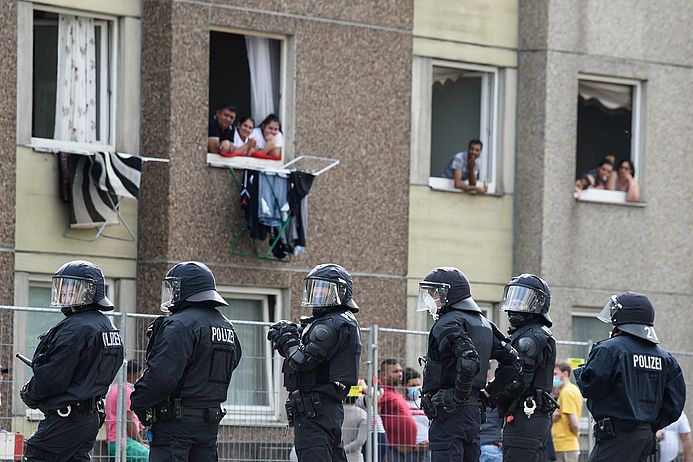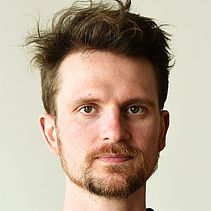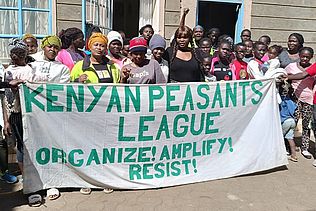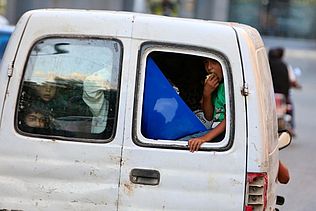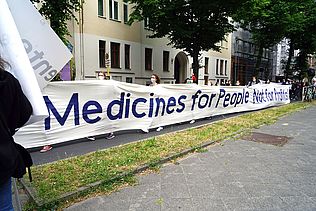These weeks mark the fifth anniversary of the corona pandemic. In this context, the new book by science historian Edna Bonhomme “A History of the World in Six Plagues” is being published. We spoke with Edna about how dealing with epidemics shapes societies, about confinement as a means of state control and personal protection, the connection between grief and fear and why more progressive projects of mutual care are needed.
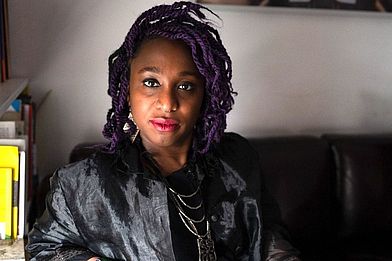
medico: As you start your book with quite a personal journey through different illnesses. Why was it important to you to write a book on the history of pandemics and on how societies dealt with them?
Edna Bonhomme: In the beginning of the COVID-19 pandemic lockdown, I, like many people, had to reflect on what it meant to have to take some pause and to think about a new condition for society, a novel disease, a set of public health regulations that were relatively new and international in terms of how they were applied. Also, there was just the sense that one had to remain socially distant to prevent others from being infected. And this elicited me the kind of circumstances to reflect not just on the current condition that we were experiencing but also on early childhood memories and how that inspired people. In a sense, I turned to Sigmund Freud and thought about the unconscious and why the initial lockdown was uncomfortable for me. I was trying to understand the profound relationship between childhood memories of confinement and the kind of adult state that I was living in.
Nevertheless, it was necessary in the context of not just the book and the writing process but also in history to have a nuanced perspective on forms of confinement, quarantine, and how they related to the spread and the hindrance of epidemics. And how the conscience, in many ways, helped to form people's reaction to confinement and the political circumstances that helped to influence it. In thinking about this delicate balance between captivity and contagion, I wanted to show the arc of epidemics in the 19th century to present. And how it also dovetails with the rise of industrialization, the rise of us humans ultimately understanding germ theory and science. And how discourses around science also helped to influence whether people accept and trust science and its many forms or if they, in some cases, resist, and that becomes a political tool.
You make the case, that confinement and quarantine is a historically rooted public health measure during pandemics, and how this is strongly connected with incarceration of socially excluded groups in non-pandemic times.
The two terms that I use in the book, confinement and captivity, have various connotations depending on who you're speaking to. So there's forced captivity that has been historically rooted in such institutions, such as chattel slavery and enslavement, which is distinct from for example, various medical forms of kind of self, or in some cases, state-regulated confinement, such as quarantine, which is the restriction of the movement of people, animals, or goods to prevent the spread of disease. That specificity is quite essential, not just in my book. Still, it should be laid out clearly in everyday life, mostly because I think that not being clear on some of these terms can and has historically led to a misunderstanding of the different forms of confinement and how they've been able to be laid out. Hence, I try to be very specific about the different kinds of confinement that are being presented. First, I look at cholera and maternal mortality within the context of enslaved people in the United States, but also, more broadly, in the Americas, I look at chattel slavery. Then, I look at the role of Robert Koch and his research on sleeping sickness in connection with the question about concentration camps in sub-Saharan Africa. Then, I look at the idea of the sickbed as a place in which a person can choose, perhaps, what confinement may be and have a sense of refuge when one is sick that isn´t imposed by the state or colonial power. I give special attention to incarceration in prison as a space of confinement, where both one's time and space and ability to determine what one eats and when one eats and all of these other factors are very restricted.
And I continue on and on. As I look at these different forms of confinement, whether imposed by the state or the self, I argue that it is crucial to have open and clear debates with scientific evidence about what it means to have medical isolation when necessary versus, in other cases, being able to have socially distant or even just caring circumstances where people can gather while also trying to reduce the spread of certain infectious diseases. I think one of the things that was difficult, particularly in one of the chapters where I discuss the spread of Ebola in West Africa during 2014, is that there are people whose loved ones have passed away, and they want to honor the dead through rituals. And being denied that didn't give the space for people to adhere to quite important rituals around burial, bereavement, and grief. And perhaps there could have been a way to prevent the spread of an infectious disease while giving people the opportunity to grieve their loved ones. That delicate balance of learning how to adjust to an environment while also giving space to people thinking about the spread of infectious diseases is essential. And it also gives people more agency to trust health authorities, particularly during an outbreak.
I agree, back in 2014 we had partner organizations in Sierra Leone working with community health workers. Those were mostly women giving care to the ones who were sick, but also giving information and emotional support for relatives and friends of them. And this was the base of trust where people would consent to public health measures, but at the same time, could be critical about the whole very harsh confinement measurements that were imposed on them.
It is important to listen and to think about people's real concerns about any medical intervention and to have conversations about an infectious disease, how it spreads, and how to reduce the spread as much as possible. If we value human life, if we say we want the best chances for people while they're on this planet, that means actually tailoring medical interventions so that we can care for as many people as possible. That is the purpose and the reason for public health. Right now, what we're seeing is that measles is having a resurgence in the US, particularly in Texas, where a community that has less vaccine uptake is being subjected to this outbreak. Part of the task of scientists, public health officials, educators, just everyday people, nurses, and doctors is to provide the space for people to have open debate while also providing scientific evidence-based approaches so that we can understand so that the public can understand public health better.
What is the connection between these anti-vaccination campaigns also during COVID and the recent far right attacks on many levels against the human right of health, not just when it comes to WHO, but also to reinforcing a global gag rule, and especially targeting the health of women.
One part of the answer is that issues surrounding one's health are very much about bodily autonomy. The most glaring ways that bodily autonomy has been emphasized is the question of reproductive rights and access to abortion. The far right denies pregnant people the right to bodily autonomy when it comes to reproduction, but then, in the same breath, will often say that any form of public health intervention regarding vaccination or medical isolation is an attack on bodily autonomy.
I find it quite striking that you write, during the flu outbreak 1918, trauma was the bond that war and flu survivors both shared. Is speaking about individual or collective trauma during COVID, and that we didn't have the time to properly grieve something that is missing?
C.S. Lewis, in “Grief observed”, noted that no one ever told me grief felt like fear. And that's precisely what happened, that people who were grieving, who couldn't find a mechanism to truly heal, at least individually or as what society was dealing with. In some cases, lack of mourning or proper mourning turned into fear, scapegoating, and so many things. Some people are still grieving. How do we examine unacknowledged forms of psychological distress and trauma? And in this respect, this is where the left can provide a suitable alternative to say, well, why don't we have free psychological support and universal support for people who are distressed for whatever reason, whether it's because they're living under capitalism. They are having to cope with not being able to survive. A person might be suffering from a chronic disease or pain and need the support to deal with that psychologically. The far-right has been able to capitalize on people's distress and use that to blame then someone, immigrants, ethnic minorities, and so forth. The left should think about how to provide and make demands for forms of community care and psychological support that are not imperial. What is sometimes missing from leftist spaces is the caring approach to comprehensive medical care.
Is this was you mean, when you say you advocate for health communism?
The term health communism has been adopted by Beatrice Adler Bolton and Artie Vierkant in their book by that same title. It lays out real concerns about the global public health, capitalism, and the health industries that make people sick. When I think about some forms of health communism, it is about ensuring that health and medicine, as resources, are not private or under capitalistic regimes but are evenly distributed globally. Whether you're living in Berlin or Kampala, that social welfare or things that we consider to be part of it, such as maternity leave, time to heal after giving birth, things like vaccines or even psychological care, all of that should just be free and readily available to people globally. And it should not be tied to charity. This idea of sense that, oh, I'm getting this from an organization because of the good grace of donation, but rather that it is seen as a human right, where people can access those resources. It is about ultimately living in a society where resources are redistributed and people have autonomy over how those resources. And no one should feel shame about accessing health regimens that are often considered lifesaving. It's not just about vaccines but access to clean water and air. We haven't seen that being exercised on a global scale. We have to ask ourselves, how do we create a system where food, medical resources, and nature are all accessible to people, and what that means for people in the global north: we might have to give up a lot so that the rest of the world can be given what they're owed.
Sounds utopian against the backdrop of the current political power shifts that put us rather in kind of a defensive mode. Just take the example of PEPFAR and USAID funding stops that left millions without basic medical treatment and to choose between buying food or buying medicine.
Yes, the cut to US foreign aid is setting the stage for disease outbreaks, particularly in unsecured areas of the African continent. For example, Ebola has had a recent presence in East Africa and Uganda, and MPOX has also had a slight surge in the Congo. The Trump administration's pause in foreign aid has created a condition where people who are the most vulnerable might then be susceptible disproportionately to infectious diseases. At the same time, that aid came with a lot of limitations. USAID funding did not include funding for abortion or funding for organizations where sex workers openly used those resources. This points out a broader thing: What are those conditions and limits, and who determines how they are laid out? When the government is involved, it can be limited to the conservative politics of a particular regime. Putting that all aside, then, what I think is essential at the current moment is to know the history of some of these foreign aid organizations, what they have provided, what they haven't, what the conditions are, and what people on the ground think. But beyond that, it means for leftist organizations to think actively about these health programs and who they benefit or harm, to work directly with people on the ground, and to build long-term, meaningful relationships with people in the global south. There needs to be a more prominent leftist alternative for us to challenge the conservatives and draconian measures and policies that are now coming into the light, not just in the United States, but elsewhere.
You write, there have always been collective actions against inequalities that came with diseases.
Yes. One example of that, at least in the 19th century, that I mention in the first chapter on cholera is the Freedmen's Bureau. Formerly enslaved and free African Americans, tried to provide free medical care to black Americans and saw it as that health should be a universal right. For a brief period during reconstruction, that is to say, after the emancipation of enslaved people in the 1860s and 70s, self-initiated projects provided many African Americans with free health care. A hundred years later, you also had within the Black Panther Party, as part of their manifesto, US citizens who had been living and being the product of Jim Crow segregation thought that health should be a priority and something freely available. They formed health clinics to provide care to different people. I'm bringing those two up as a kind of model, but there are so many other examples that were happening on a local level amongst feminist groups as well. Health collectives formed in the ‘60s and ‘70s, not just in the United States but elsewhere. This is where educating ourselves on these leftist movements can help us see what worked, what didn't, and how to build movements that allow the space for mutual aid.
The interview was conducted by Felix Litschauer.

